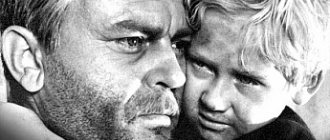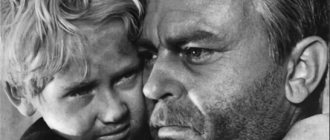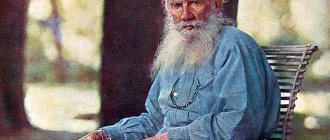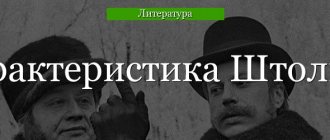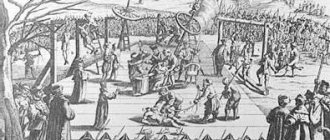Heroism and courage
32 sentences / 657 words
The story “The Fate of a Man” was written by Mikhail Aleksandrovich Sholokhov in 1956 and was soon published in the Pravda newspaper. This is a sad story of the difficult life of a simple Russian driver Andrei Sokolov.
The fate of this man is truly tragic. Quite early on, the hero was left an orphan, as hunger claimed the lives of his parents and sister. Andrei himself, in order to survive, had to go to Kuban and start “attacking the kulaks.”
Returning from there, the man married a “meek,” cheerful and “obsequious” girl Irina and began working as a driver, then the young family had children. It would seem that life began to get better, but suddenly war broke out, and Andrei Sokolov was among the first to go to the front. Despite the fact that the harsh military life, of course, burdened the hero, he never dared to complain about it to his wife. He believed that “that’s why you’re a man, that’s why you’re a soldier, to endure everything, to endure everything, if need calls for it.”
In the future, life itself seems to be trying to test this statement of Andrei Sokolov, and is preparing a new terrible test for him: the man is captured by the Germans. This happens when he, without thinking for a moment, decides to accomplish a real feat: to deliver shells to a battery of his soldiers, which is located in a hot spot and is about to engage in battle with the enemy. Andrei himself speaks very simply about his heroic deed: “My comrades may be dying there, but am I going to pine away here?”
Indeed, this man was ready to give his life for his comrades, just like they did for him. In the work, the author gives many examples of the courage of Russian soldiers. Suffice it to recall the military doctor who “in captivity and in the dark” did “his great work”: at night, when the Germans herded all the Russian prisoners into the church, he passed from one soldier to another and tried to help his compatriots in whatever way he could.
The soldiers stoically endure all the trials that befall them in German captivity: this includes unbearably hard hard labor, constant hunger, cold, beatings, and simply bullying from their enemies. In such difficult conditions, these people do not lose the ability to joke and laugh, which says a lot about their courage and fortitude.
Living in constant fear makes Andrei Sokolov and his comrades truly brave. Suffice it to recall the episode where the Germans want to shoot the main character (even before they decide to take him prisoner). At this moment, being wounded, he still rises to his feet and fearlessly looks his possible killer straight in the eyes. Further, soldier Sokolov, despite the risk of being captured and killed, decides to bravely escape from captivity, but, unfortunately, this attempt is unsuccessful.
The second attempt to get out of captivity turns out to be successful for Andrei, and the man returns to his own. But the most terrible news, which will require from the hero no less, and perhaps even more courage, than all military trials, awaits the soldier Sokolov ahead. While in the hospital, Andrei learns from a neighbor’s letter about the death of his wife and daughters, and then, after the end of the war, he is informed that his son was killed on Victory Day.
Such things sometimes break even the strongest and most courageous men, because soldiers live in war and in captivity with the hope of returning to their relatives. But tragic events open up new reserves of kindness and humanity in Andrei Sokolov, and therefore he takes in the young orphan Vanya to raise him. This noble deed, like all the brave deeds performed by Sokolov in the war, can rightfully be considered a real feat and a manifestation of heroism in our everyday life.
Source
Can Andrei Sokolov’s personality be considered heroic? (based on Sholokhov’s story “The Fate of Man”)
The main character of Mikhail Aleksandrovich Sholokhov's story “The Fate of a Man,” Andrei Sokolov, is a man with a persistent and integral character. Can he be considered a heroic person? We'll figure out.
The heroism of this man is manifested in war. For Sokolov, saving his own life is not important when the Fatherland is at stake. He is easily ready to accept death if it helps his native country defeat the fascist invader.
Let us prove with specific examples how the heroism of the main character of the story, Mikhail Sholokhov, is manifested. Let's take a situation where, during a battle, one of the military batteries was left without shells. Sokolov understood that soldiers without ammunition were doomed to certain death. Andrei cannot sit back when his comrades are on the verge of death. The main character is trying to slip past the Germans and deliver much-needed shells. And even if it doesn’t work out, it’s not Sokolov’s fault. The man did everything he could.
Another example of his heroic behavior is his interrogation with Commandant Müller. Sokolov's careless speeches about the unfair treatment of prisoners reached the ears of the camp authorities. Andrei faced certain punishment - execution. The hero did not even think of giving up his words. It would be beneath his dignity. Sokolov did not ask for mercy and steadfastly endured all the German’s bullying. He passed the food test with honor, turning away from the table laden with various dishes. Andrei also refused to drink to the victory of the invaders. This played a decisive role in the fact that Mueller canceled the execution. The commandant realized that a real Russian soldier was standing in front of him. Sokolov's behavior aroused the admiration of the camp commander. Sholokhov emphasizes the fact that even opponents treat the hero with respect for his heroism.
Escape from captivity is another manifestation of Sokolov’s heroic character. The man takes the German major with him, thereby putting his life in danger. A German who woke up could enter into a fight with Andrei, and it is unclear which side would be victorious. But at these moments he did not think about himself at all. Another thing was more important to him - to deliver the German to the Russian commanders so that they would receive the necessary information from him.
Sokolov’s heroism is easy to see in his attitude towards others. The hero tries to support his comrades in misfortune: he arranges lynching, not tolerating betrayal in the team. Having received a treat from Muller, Andrei shares it with other prisoners, leaving himself the same portion as everyone else. He would never eat bread and lard alone. such behavior is not at all characteristic of his nature.
Well, the last manifestation of Andrei Sokolov’s heroic character is the adoption of the orphan Vanyusha. The man takes responsibility for this boy. Vanyusha becomes his meaning of life, a real salvation. Sokolov cannot ignore the grief of others. And this act again characterizes him as a heroic person.
Looking at all the examples given, we can say that Andrei Sokolov is a man with a capital M.
See more essays on the story “The Fate of Man”:
Essay on the story “The Fate of Man”
Characteristics of Andrei Sokolov in Sholokhov’s story “The Fate of a Man”
The feat of man in war (based on Sholokhov’s story “The Fate of Man”)
The life path of Andrei Sokolov (based on Sholokhov’s story “The Fate of a Man”)
Analysis of the ending of Sholokhov’s story “The Fate of Man”
The theme of courage and dedication in the story by M. A. Sholokhov “The Fate of a Man”
The theme of courage and dedication runs through Mikhail Sholokhov’s story “The Fate of a Man.” These two concepts become the most important for the image of the main character. Andrei Sokolov was able, step by step, to overcome not only the adversities encountered along the way, but also to step over “I can’t” when his strength was already leaving him. And all this applies not only to military service, but also to the period of captivity.
And now the main character has met his interlocutor to share with him what has accumulated in his soul. From the first days at the front, we see the image of a man who is not only courageous, but also understanding. After all, courage is not only the ability to fight something or withstand adversity. This is a person’s ability to retain his experiences, failures and adversities. “That’s why you’re a man, that’s why you’re a soldier, to endure everything, to endure everything, if need calls for it.”
Having gathered his courage, there he thought only about one thing: “... I have my own, Russian dignity and pride, and that they did not turn me into a beast, no matter how hard they tried.” However, not everyone can withstand the hardships of war. Some believe that a deal with their conscience will help them get out of this situation dry and, most importantly, alive and unharmed. This is how Kryzhnev appears in the story, who in captivity completely forgets about his comrades. “Comrades,” he says, “remained behind the front line, but I’m not your comrade, and don’t ask me, I’ll point you out anyway.
Your own shirt is closer to your body.” And Sokolov makes the right decision in the current situation - to strangle the traitor. By this, he not only saves many, but gives a chance to go through and escape from these circles of hell. After all, it was his comrades who supported him at the beginning of this path. “But our people caught me on the fly, pushed me into the middle and led me by the arms for half an hour.”
With such support from his comrades, only a purposeful and selfless person was able to overcome this difficult path. “Only skin remained on the bones, and I couldn’t even carry my own bones. But give me work and don’t even say a word, but such work that it wouldn’t fit a draft horse.” When Sokolov decided to escape, note that this was not his first attempt, he was thinking about how to help his own. “Your major and his briefcase are worth more than twenty ‘tongues’ to us,” the colonel praised the former prisoner of war. The only thing that helped me survive two long years of captivity were memories of my family. But “everything collapsed in a single moment, I was left alone.” The war destroyed the life of the main character. He was again left alone with a deep, unhealing wound in his heart, which over time began to play pranks. And only a little ragamuffin was able to melt the ice in the soul of a selfless person.
Now it is he who becomes the support and inspiration for Andrey. This little man became for him someone for whose sake he could again endure adversity and courageously and selflessly overcome any obstacles that arise. There are other characters in the story who also come into contact with the central concepts of the theme of the essay. These are prisoners of war, always ready to help another: “God forbid you fall!” Go with all your strength, otherwise they will kill you.”
And friends who sheltered a lonely soul after the war. But especially in this row of courageous people stand women and children: “What kind of shoulders did our women and children have to have so as not to bend under such a weight!” Men and young guys, being on the front line, boldly walked into battle, not because they were sure that they were covered by a reliable rear. These weak and defenseless people not only worked selflessly for the front, but also helped courageous soldiers not to break down. “But in captivity, I talked to myself almost every night, of course, with Irina and the kids...” Another courageous person on the pages of the story is a military doctor. Even in captivity, he does not forget about his profession. By providing medical assistance even in such a difficult situation, he gives prisoners of war a chance to eventually be free again, and not die on the way to this goal. After all, it is not yet known how many lives such military doctors saved.
The moral feat of man in Sholokhov’s story “The Fate of Man”
The main character in M. Sholokhov's story “The Fate of a Man” is Andrei Sokolov. A man who went through the whole war and lost his family, but still did not break, he found the strength to live on. Sholokhov very accurately described the heroes of the war in his works, because he communicated with some of them live. One of these people was a simple stranger whose fate was very similar to the fate of Andrei Sokolov. That's how this great story came about.
Andrei Sokolov is a person who combines all the best qualities, these are: intelligence, kindness, courage, bravery, but also he is very modest and fair. The main character of this work was born at the beginning of the 20th century. He completely went through the entire civil war and went to live in a village near Voronezh. Here Sokolov starts a family and works, he lives a quiet and calm life, but all this comes to an end when the Second World War begins.
Having experienced such great grief, Andrei found the strength not only to live on, but also to raise Vanyushka, despite the fact that his entire family died in the war. M. Sholokhov very accurately described the image of the Soviet man, such a simple, but at the same time a real hero. This is a man with an unbending character, who, despite all the grief he experienced, did not fold his arms, but continued to live and raise the boy, who throughout all this time became like his own son. The fate of Andrei Sokolov is an example for every person on earth.
The theme of the feat in the story by M. A. Sholokhov “The Fate of Man” (Final essay)
M. A. Sholokhov’s story “The Fate of Man” was created in 1956, a decade after the Great Patriotic War, during the Khrushchev Thaw.
It was then that the need arose to sum up the results of the past war, to comprehend the fate of the people and the fate of the individual, and to reveal the origins of the feat. The main character of the story, Andrei Sokolov, is the same age as the century.
The story of his life is also the history of the country. At first glance, before us is an ordinary person, just like everyone else, a simple man from the people, and his fate is inseparable from the fate of his Motherland. A native of the Voronezh province, during the civil war he was in the Red Army. In the hungry year of twenty-two, he worked for the kulaks and thereby saved himself from hunger. He worked at a factory, married an orphan.
Sholokhov does not idealize his hero. Returning from work tired and angry, he spoke rudely to his wife and sometimes drank. But he got a wife - gold, quiet, affectionate, meek and patient. Thanks to her kindness, there was peace in the family, and Andrei had peace in his soul.
Exploring the character of his hero, Sholokhov tries to understand how a simple and inconspicuous driver, a hard worker, turns out to be capable of heroic deeds during the war years.
From the very beginning of the war, Andrei Sokolov showed strength of character, perseverance, and courage. In his letters to his wife, he never complained about difficulties, realizing that it was also not easy for women in the rear.
While performing a dangerous task - it was necessary to transport shells to the battery - Sokolov came under artillery fire and lost consciousness. So Andrei was captured.
He had to endure a lot: bullying, beatings from the Germans, hunger, and hard work, but the soldier did not lose his human dignity and retained his strength of spirit. His duel with the camp commandant Müller ended in a moral victory for the ordinary Russian soldier. Going to the commandant’s office, Sokolov was preparing for death, but managed to gather his courage “to look into the hole of the pistol fearlessly, as befits a soldier, so that his enemies would not see at the last... minute” that it was difficult for him to part with his life.
Muller appreciated the bravery of the Russian soldier and gave him life.
Andrei Sokolov not only managed to escape from captivity, but also delivered an important German general to our unit.
But the main test awaited the ordinary Russian soldier after the war. An air bomb hit Sokolov’s house, killing his wife and daughters. Anatoly’s son was killed by a German sniper on Victory Day. How to live when there are no loved ones and relatives?
The soldier’s heart did not harden; it retained the capacity for love, mercy, and compassion. Andrey adopted an orphan boy, Vanyushka, with eyes as clear as stars. The heart of a man thaws near the child, with eyes “as if sprinkled with ashes, filled with such inescapable melancholy that it is difficult to look into them.”
And there is no higher spiritual, moral feat when a person, “distorted by war,” retains a living soul within himself and gives the warmth of his heart to the one who needs it most - a child orphaned during the war.
Option 2
In the image of the main character of the work, the author showed the best qualities of a Russian person, his behavior in extreme situations.
Andrei Sokolov faced the same trials that many of his compatriots had to go through. Outwardly an unremarkable person, skilled in ordinary blue-collar professions, he fought in the Civil War on the side of the Reds, then escaped from the post-war famine by working for the kulaks. Having lost his family, Andrei married an orphan and had children. Like many others, during industrialization he acquires a new specialty, becoming a driver.
Andrei believed that the Germans needed to be fought and at the first opportunity, risking his life, he escaped from captivity, capturing a German officer.
His wife and children died during the war, and Andrei was left completely alone. It is significant that, having learned about the death of his family, and seeing a bomb crater on the site of his house, he did not fall into hysterics, but showed perseverance, immediately going back to the front. Despite the severity of being left alone, the hero of the story was imbued with sincere sympathy for the little orphan boy and took him in, thereby finding the meaning of life.
The hero of the story showed not only toughness and resilience in relation to enemies and difficult life circumstances. The trials he had to go through did not harden the soul of this man, did not erase his kindness and compassion for others.
Encyclopedia of Shkolnik - the commonwealth of Russian word and literature
Clear, convincing in its simplicity and harsh truth, the work of M. Sholokhov still makes the reader indignant and shudder, passionately love and keenly hate.
Before us is an unforgettable image of an ordinary Soviet soldier - Andrei Sokolov. A man who endured everything, overcame everything... The great Sholokhov art of portraiture: it is fresh, extremely compressed and expressive. From two or three phrases dropped by the author as if in passing, we learn that Sokolov is “tall, stooped,” that his hand is “large, callous,” and he speaks in a “muffled bass voice.” And only after the narrator uttered the first phrase of his story: “Well, and there, my brother, I had to sip the bitterness in the nostrils and above,” does his portrait immediately appear before us, drawn with one or two unforgettable features.
The portrait of the second character in the story, the commandant of the Müller camp, is just as briefly and vividly sculpted to the point of physical palpability.
And the image of the warm-hearted, intelligent wife of Andrei Sokolov, the orphan Irinka, who grew up in an orphanage. With her devotion, holy sacrificial love, she resembles the beautiful images of Nekrasov’s Russian women. And again he is so visibly sculpted plastically, and not only externally, but also in the most complex mental movements. The author achieves particular power in the scene of farewell at the station in the first days of the war.
The volume of the story is striking: the whole life of the family, and the war, and captivity. Even more amazing is the revelation of the image of Andrei Sokolov. On the small “platform” of the story, a person is shown in joy, and in trouble, and in hatred, and in love, and in peaceful work, and in war. Behind this image stands a multimillion-strong, great, kind, long-suffering working people. And how this peaceful people is transformed during the years of military disasters!
Russian soldier! What historian, artist fully depicted and glorified his valor?! This is a sublime and complex image. Much is fused and intertwined in him that made him “not only invincible, but also a great martyr, almost a saint - traits that consisted of an ingenuous, naive faith, a clear, good-natured, cheerful outlook on life, cold and businesslike courage, humility in the face of death, pity for the vanquished, endless patience and amazing physical and moral endurance” (A. Kuprin).
The typical features of a Russian soldier are embodied in the image of Andrei Sokolov. This man’s extraordinary endurance, fortitude, and high moral qualities in the most difficult moments of war, captivity, and post-war life evoke a feeling of admiration. “...And I began to gather my courage to look into the hole of the pistol fearlessly, as befits a soldier, so that my enemies would not see at my last minute that it was still difficult for me to part with my life...” says Sokolov. The noble pride of a soldier who does not want to show the enemy the fear of death because shame is worse than death.
The ability to bring the breadth of life's display to an epic sound is characteristic only of enormous talent. Carefully reading the structure of the story, one cannot help but notice the fairytale technique that the author resorts to, showing the single combat of the Lagerfuhrer and “Russian Ivan”: as in epics and ancient tales that have come down to us from the depths of the people, M. Sholokhov uses the technique of triple amplification. The soldier drank the first glass, preparing for death, and did not take a bite. He drank the second glass and again refused the snack. And only after the third, stretched glass of schnapps, “he took a bite of a small piece of bread and put the rest on the table.”
This is a traditional fairy-tale increase in the drama of the action over time. The writer used it quite naturally, and this technique of storytellers harmoniously merges with his modern story. The work of M. Sholokhov is national in language. The writer reveals the typical image of the Russian soldier Andrei Sokolov in the structure of thought and speech, full of apt, original words and folk sayings.
Ready-made school essays
Collection of cheat sheets for school essays. Here you will find a spur on literature and the Russian language.
Sokolov’s life feat (About the story “The Fate of a Man”)
Clear, convincing in its simplicity and harsh truth, the work of M. Sholokhov still makes the reader indignant and shudder, passionately love and keenly hate.
Before us is an unforgettable image of an ordinary Soviet soldier - Andrei Sokolov. A man who endured everything, overcame everything... The great Sholokhov art of portraiture: it is fresh, extremely compressed and expressive. From two or three phrases dropped by the author as if in passing, we learn that Sokolov is “tall, stooped,” that his hand is “large, callous,” and he speaks in a “muffled bass voice.” And only after the narrator uttered the first phrase of his story: “Well, and there, my brother, I had to sip the bitterness in the nostrils and above,” does his portrait immediately appear before us, drawn with one or two unforgettable features.
The portrait of the second character in the story, the commandant of the Müller camp, is just as briefly and vividly sculpted to the point of physical palpability.
And the image of the warm-hearted, intelligent wife of Andrei Sokolov, the orphan Irinka, who grew up in an orphanage. With her devotion, holy sacrificial love, she resembles the beautiful images of Nekrasov’s Russian women. And again he is so visibly sculpted plastically, and not only externally, but also in the most complex mental movements. The author achieves particular power in the scene of farewell at the station in the first days of the war.
The volume of the story is striking: the whole life of the family, and the war, and captivity. Even more amazing is the revelation of the image of Andrei Sokolov. On the small “platform” of the story, a person is shown in joy, and in trouble, and in hatred, and in love, and in peaceful work, and in war. Behind this image stands a multimillion-strong, great, kind, long-suffering working people. And how this peaceful people is transformed during the years of military disasters!
Russian soldier! What historian, artist fully depicted and glorified his valor?! This is a sublime and complex image. Much is fused and intertwined in him that made him “not only invincible, but also a great martyr, almost a saint - traits that consisted of an ingenuous, naive faith, a clear, good-natured, cheerful outlook on life, cold and businesslike courage, humility in the face of death, pity for the vanquished, endless patience and amazing physical and moral endurance” (A. Kuprin).
The typical features of a Russian soldier are embodied in the image of Andrei Sokolov. This man’s extraordinary endurance, fortitude, and high moral qualities in the most difficult moments of war, captivity, and post-war life evoke a feeling of admiration. “...And I began to gather my courage to look into the hole of the pistol fearlessly, as befits a soldier, so that my enemies would not see at my last minute that it was still difficult for me to part with my life...” says Sokolov. The noble pride of a soldier who does not want to show the enemy the fear of death because shame is worse than death.
Even among cruel enemies in whom fascism has burned out everything human, the dignity and self-control of the Russian soldier evokes respect. “That's what, Sokolov, you are a real Russian soldier. You are a brave soldier. I am also a soldier and I respect worthy opponents. I won't shoot you. Moreover, today our valiant troops reached the Volga and completely captured Stalingrad,” says Muller.
The ability to bring the breadth of life's display to an epic sound is characteristic only of enormous talent. Carefully reading the structure of the story, one cannot help but notice the fairytale technique that the author resorts to, showing the single combat of the Lagerfuhrer and “Russian Ivan”: as in epics and ancient tales that have come down to us from the depths of the people, M. Sholokhov uses the technique of triple amplification. The soldier drank the first glass, preparing for death, and did not take a bite. He drank the second glass and again refused the snack. And only after the third, stretched glass of schnapps, “he took a bite of a small piece of bread and put the rest on the table.”
This is a traditional fairy-tale increase in the drama of the action over time. The writer used it quite naturally, and this technique of storytellers harmoniously merges with his modern story. The work of M. Sholokhov is national in language. The writer reveals the typical image of the Russian soldier Andrei Sokolov in the structure of thought and speech, full of apt, original words and folk sayings.
But not only in the noted external signs, such as the technique of triple amplification and the saturation of the language with vivid expressions and proverbs, but, as Belinsky said, in the very “fold of the Russian mind, in the Russian way of looking at things,” the writer’s nationality is manifested. A sensitive artist, M. Sholokhov was connected with the life of his people, with their thoughts and hopes, with all his life and all his thoughts. His creativity was nourished by the life-giving springs of folk wisdom, its great truth and beauty. This determined the fidelity to every detail, every intonation of his work. The main advantage of the story is probably that it is built on the correct disclosure of the deep movements of the human soul.
It would seem that the strength of Andrei Sokolov, mercilessly beaten by life, was about to dry up. But no! An inexhaustible source of love lurks in his soul. And this love, this good beginning in a person guides all his actions.
Essay by Andrey Sokolov
The work is a confession of an ordinary Russian person, crippled by a difficult life.
The main character of the story is Andrei Sokolov, a tall man with a stooped back, huge hands black from hard work, eyes filled with melancholy and emptiness. Andrei appears before the reader dressed in a darned, burnt-out padded jacket and having an unkempt, unkempt appearance.
From early childhood, having lost his parents and participating in the civil war, a man feels the hardships and hardships of life. Returning to his native Voronezh village, Andrei gets married, and fate gives him a chance to feel the happiness of family life with a decent and thrifty wife, who gave Sokolov beautiful children.
With the beginning of the Great Patriotic War, Andrei goes to the front, is repeatedly wounded and shell-shocked, and then, by coincidence, ends up in German captivity. While in the concentration camp, Sokolov does not lose his fortitude, shows courage and bravery, killing a traitor to his homeland and flatly refusing to drink with the Nazis for their victory.
One day Andrei manages to escape from fascist captivity, taking with him a high-ranking German officer. Once on his native land, Sokolov throws himself on his knees and, crying bitterly, showers the ground with kisses, not yet fully realizing that all the suffering of life in captivity is behind him.
Returning to duty, Andrei receives the terrible news that his entire family is listed as dead, with the exception of his son Anatoly, who is also fighting at the front. By the will of fate, before the end of the war, Anatoly dies and Sokolov remains alone in the whole wide world, unable to even feel all the joy and happiness of victory over fascism.
After the war, Andrei remains to live in the house of a front-line friend in a provincial Russian town and one day meets a little boy on the street who turns out to be an orphan. Sokolov, tired of the joyless loneliness and melancholy from the loss of loved ones, formalizes the adoption of the baby, with whose appearance Andrei’s life begins to take on new meaning.
The writer, narrating the difficult fate of the Russian people using the example of Andrei Sokolov, talks about the human suffering experienced, the enormous human grief that the war brought with it, but at the same time the author is proud of the perseverance, nobility and courage of the ordinary Russian person, unbroken by life’s difficulties and trials.
The life path of Andrei Sokolov (based on Sholokhov’s story “The Fate of a Man”)
The story “The Fate of a Man” by Mikhail Aleksandrovich Sholokhov is one of the best works about the war. In it, the author showed the greatness of a man who managed to overcome all the hardships of a terrible event - war.
The main character of this story is a Russian soldier named Andrei Sokolov, who experienced a devastating sense of loss, but found the strength to live on. Why was he able to perk up and not give up? I think the reason lies in the strong Russian character and great love for their fatherland. Only this all-consuming feeling of patriotism allows you to withstand and repel the pressure of a strong enemy, and then live, hiding at the bottom of your soul all the pain from what you experienced.
Andrei Sokolov is an ordinary Russian person, like many in our country, a hard worker. He is a driver by profession. Sokolov had a family and a home. And this is what the man valued more than anything else, in this he saw the meaning of life. Andrei dreamed of working for the good of his homeland, raising children, waiting for grandchildren. But these plans were not destined to come true. The war changed everything. Turned everything upside down. In an instant, Sokolov lost everything he had. And it was as if the light around him had faded.
War in itself is a terrible test. But Sokolov had it doubly hard, because he ended up in German captivity. But Andrei did not disgrace the title of a Russian soldier, he endured everything, remained faithful to his homeland. And besides, he hasn’t lost his sense of humor. The man talked about all the hardships that befell him, jokingly, as if there was nothing special about it. The hero is not afraid of the German occupiers, he speaks openly about the conditions in which they keep prisoners.
How dignified Sokolov behaves in front of Muller. A physically and mentally weakened man is still strong. Andrei refuses the German's handout and agrees to drink only to his death. But he would not drink for the victory of the Germans for anything in the world! Muller, seeing such power of the Russian man, could not help but admire. He saved the hero’s life and even gave treats to the barracks.
But the trials in Andrei Sokolov’s life did not end with the end of the war. He was left alone, having lost his family, the hero lost himself. Why should he live now? Where to find meaning? Yes, Andrei continued to work, but the feeling of emptiness forced him to drink more often. This helped, at least for a short while, to drown out the pain burning my soul. And at this moment, fate gifts Sokolov with the orphan Vanyusha, a boy as lonely as the hero himself. He became for Andrei that lost meaning of life, he became a real son for him. Having made such a decision, Sokolov felt how his soul thawed, how joyful and warm it became.
At the end of the story, the hero expresses the hope that modern generations who grew up in the post-war era will not lose touch with their homeland and will be able to stand up for it if necessary. Sokolov believes that the Russian character will not diminish, it will remain as strong and unbending, nothing can bend it, let alone break it. A Russian person will be able to overcome all trials on his life's path.
See more essays on the story “The Fate of Man”:
Essay on the story “The Fate of Man”
Characteristics of Andrei Sokolov in Sholokhov’s story “The Fate of a Man”
The feat of man in war (based on Sholokhov’s story “The Fate of Man”)
Can Andrei Sokolov’s personality be considered heroic? (based on Sholokhov’s story “The Fate of Man”)
Analysis of the ending of Sholokhov’s story “The Fate of Man”
The feat of a soldier in M. Sholokhov’s story “The Fate of a Man”
M. Sholokhov posed and resolved serious philosophical and moral problems in his works. In all the writer’s works, in one context or another, the interweaving of two main themes can be traced: the theme of man and the theme of war.
In “The Fate of Man,” Sholokhov reminds the reader of the disasters that the Great Patriotic War brought to the Russian people, of the fortitude of a person who withstood all the torment and did not break. Sholokhov's story is permeated with boundless faith in the spiritual strength of the Russian person.
The plot is based on vivid psychological episodes. Farewell to the front, captivity, attempted escape, second escape, news of the family. Such rich material would be enough for a whole novel, but Sholokhov managed to fit it into a short story.
This man had a hard time in life. He goes to the front and is captured in inhuman living conditions. But he had a choice; he could have ensured a tolerable life for himself by agreeing to inform on his own comrades.
The feat of Andrei Sokolov in M. Sholokhov’s story “The Fate of Man”
Advanced training course for 340 rubles!
Emotional burnout of teachers. Prevention and ways to overcome
Koroleva Natalya Valerievna, teacher of Russian language and literature
Literature lesson
9th grade
Topic: Andrei Sokolov’s feat in M. Sholokhov’s story “The Fate of a Man”
SLIDE 1
Target:
show the heroism of a simple Russian person who survived all the hardships of the war, but managed to maintain the warmth of his soul.
improve skills in analyzing a literary work;
contribute to enriching students' vocabulary through lexical work with unfamiliar words;
improve skills in working with the Legal Reference System “Consultant Plus: Secondary School”.
help children discover the contradiction between legislation and real life;
improve the ability to expressively read and speak coherently;
practice the ability of comparative analysis of documents and works of art;
develop the skill of working with various sources of information in order to search and select the necessary material;
to form independent thinking.
show children the value of human life;
to cultivate in the learning process such moral qualities as honesty, kindness, justice, a sense of duty, mercy, and loyalty to one’s word;
instill a love for literature and the history of your homeland;
cultivate respect for the opinions of others.
Methodical techniques:
analytical work with text, comparison techniques, independent work.
Forms of organizing educational activities:
group and frontal work.
Equipment:
computer, multimedia projector, presentation, Legal reference system "Consultant Plus: Secondary School", handouts, workbooks, textbook: Literature. 9th grade. Textbook-reader for educational institutions. Compiled by V.Ya.Korovina, I.S.Zbarsky, V.I.Korovin. - M.: Education, 2010.
One of Sholokhov’s outstanding works is the story “The Fate of a Man,” published in 1957. It was written relatively quickly, but it was preceded by a significant creative history: about 10 years passed between the chance meeting with the man who became the prototype of Andrei Sokolov and the creation of the story . The author shows the tragedy of our people during the war, talks about the disasters and suffering that befell the Russian people.
